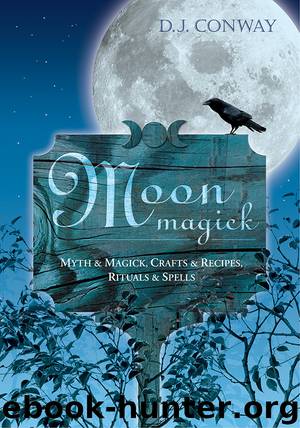Moon Magick by D.J. Conway

Author:D.J. Conway
Language: eng
Format: epub
Tags: spell, ritual, rite, ceremony, worship, magic, rituals, initiation, spells, spellcraft, spellwork, magick, Invocation, Evocation, lunar, moon, luna, night
Publisher: Llewellyn Worldwide, LTD.
Published: 2014-01-09T16:00:00+00:00
[contents]
10. This list of names often varies.
11. Lest anyone think I’m copying from the Christians here, these words and expressions were recorded in ancient Egyptian writings long before the Christians decided to call them their own.
Chapter 11
CORN MOON
August
Also called: Barley Moon, Dispute Moon,
Weodmonath (Vegetation Month), Harvest Moon,
Moon When Cherries Turn Black.
Month of the Hindu festival for Ganesha; called the Ganesha Chaturthi, or Chauti.
Aug. 1: Festival of New Bread among the Celtic countries. Among the Aztecs, the festival of Xiuhtecuhtli, god of the calendar and spiritual fire.
Aug. 1-3: Festival of the Dryads in Macedonia, honoring the maiden spirits of the water and woodlands.
Aug. 6: A festival of Thoth in Egypt. Beginning of the Month of Ghosts in China and Singapore.
Aug. 7: In Egypt, the Breaking of the Nile, dedicated to Hathor.
Aug. 12: The Egyptian Blessing of the Boats.
Aug. 13 & 15: Diana of the Wildwood and Hecate, the Dark Mother of the Moon in very early Greece and Rome; Full Moon.
Aug. 17: Full Moon feast of Diana in Rome.
Aug. 23: Nemesea, the festival of Nemesis (goddess of Fate) in Greece. In Rome, the Volcanalia, a festival for the god Vulcan to ward off accidental fires. In Rome, the Vertumnalia, honoring Vertumnus, god of the changing seasons.
Aug. 25: In Rome, the Opseconsiva, a harvest festival for the goddess Ops.
Aug. 26: Feast Day of Ilmatar or Luonnotar, Finnish goddess.
Aug. 29: Birthday of Hathor and New Year’s Day in Egypt.
Aug. 30: Roman festival of thanksgiving, called the Charisteria.
Aug. 31: Hindu festival of Anant Chaturdasi, women’s purification, honoring the goddess Ananta.
A ugust, originally called Sextilis by the Romans, was later named Augustus in honor of Augustus Caesar. Gathered harvests were celebrated in many lands during this month.
August 1 was a Celtic feast called Lunasa or Lughnassadh, meaning the celebration of harvest and new grain for bread. In Old English this became Lammas, or “Loaf Mass.” The Romans also had a harvest festival during this month, that of the Consualia when sacrifices to Consus were made. Consus was the god of the underground storehouse where the grain was kept.
They also celebrated the Opseconsiva, a harvest festival for the goddess Ops. Wine and freshly baked bread were placed on her altars. Near the end of the month they had a thanksgiving feast called the Charisteria.
At three times during August, the Romans honored the god Vulcan: on August 17 at the Portunalia; on August 27 at the Volturnalia; and again on August 23 at the Volcanalia. This last festival was held outside the city boundaries and was to ward off accidental fires, a real threat in such closely-packed and fire-prone towns. Vulcan was not the only deity honored during these festivals. The goddesses Juturna (deity of fountains) and Stata Mater (who put out fires) were invoked as a counterbalance to Vulcan’s fires—volcanoes or otherwise.
The very early Greeks had a holy day for Hecate the Dark Mother on August 13, and ten days later one for Nemesis, the goddess who balanced the scales of justice with rightful revenge and punishment.
Download
This site does not store any files on its server. We only index and link to content provided by other sites. Please contact the content providers to delete copyright contents if any and email us, we'll remove relevant links or contents immediately.
The Compound Effect by Darren Hardy(8913)
Wonder by R.J. Palacio(8560)
Atomic Habits: Tiny Changes, Remarkable Results by James Clear(8312)
Becoming Supernatural by Dr. Joe Dispenza(8190)
Wonder by R. J. Palacio(8092)
Change Your Questions, Change Your Life by Marilee Adams(7724)
The Road Less Traveled by M. Scott Peck(7578)
Born to Run: by Christopher McDougall(7115)
Daring Greatly by Brene Brown(6494)
Big Magic: Creative Living Beyond Fear by Elizabeth Gilbert(5731)
Grit by Angela Duckworth(5588)
The Slight Edge by Jeff Olson(5401)
Men In Love by Nancy Friday(5223)
The Wisdom of Sundays by Oprah Winfrey(5138)
You Are a Badass at Making Money by Jen Sincero(4908)
Fear by Osho(4724)
The Miracle Morning by Hal Elrod(4697)
The Four Tendencies by Gretchen Rubin(4588)
Rising Strong by Brene Brown(4439)
